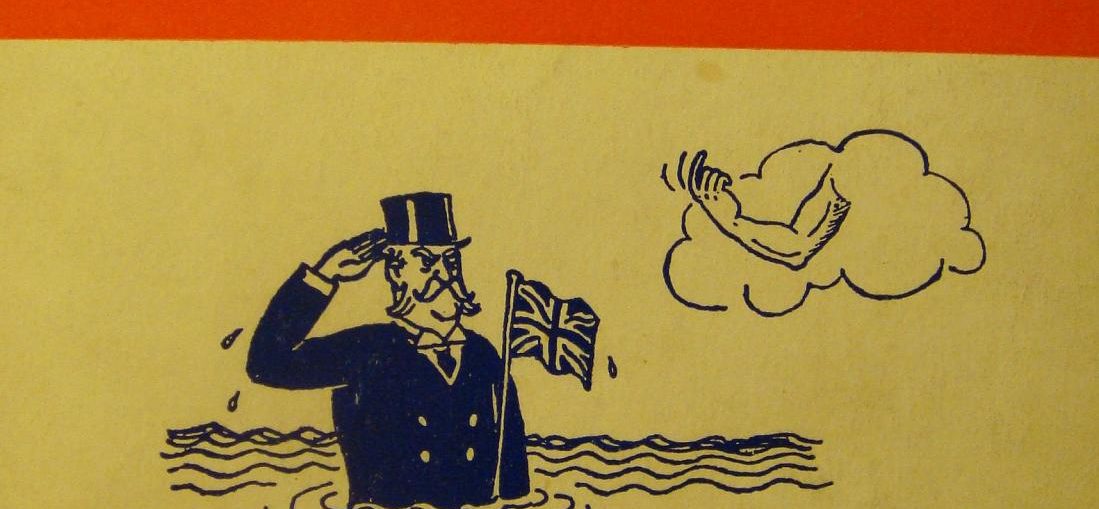
Despite controlling one-third of the world’s landmass and one-quarter of its population at its peak in the late 19th century, one really has to wonder if the English are even civilized in the first place. As Indian historian and MP Dr. Shashi Tharoor stated in a 2015 speech at Oxford University, “No wonder the sun never set on the British Empire… even God couldn’t trust the English in the dark.”
In G.J. Renier’s The English: Are They Human?, the author sets out to examine why the English are the way they are; it’s not an easy task. Despite the title being absolutely hilarious, the book itself is somewhat humorous, but overall quite academic. This, to me, is quite disappointing. Thus, I am setting out to improve upon his work, and find some case studies that properly shed light on what makes the English such an absurd people. Fortunately, there’s so much out there to choose from. After careful research, it is my conclusion that the English cannot be considered human.
Why?
Well, they used to eat random garbage thrown into casings, all under the guise of it being “sausage”!

LITTLE BAGS OF MYSTERY
Date: Mid-19th century
Location: Victorian England – especially the urban parts
Oh, sausages. You tempting, phallic little things. How I delight in your salty, savoury goodness. At least I know from my local organic butcher I’m getting quality product most of the time. Hell, even a Johnsonville brat is safer than the horrors that awaited the hungry clientele of England in the mid-19th century.
As I have mentioned continuously, Victorian England was not known for its safety regulations. With poverty, pestilence and starvation commonplace, who would even have time for such trivial matters? Considering the overwhelming likelihood of croaking in childhood, or perhaps in a horrific factory accident in early adulthood, why not just do whatever the fuck you want anyway?
Such was the attitude towards food that the lower classes were forced to have during this era. Was it nutritious? Not especially. Was it tasty? Once again, no. But was it cheap? Most definitely.

With so many mouths to feed, sausages were a go-to staple for hungry families. All the better when they were on sale… which occurred typically when the source product was of even sketchier origins. Despite putrid sausages sounding like an urban legend, there are enough newspaper clippings available to assert that this was, in fact, actually pretty common practise for unscrupulous butchers. Consider some of the following stories here, including a very early one from the Morning Chronicle of London, dated March 30, 1857…
Unwholesome Food—“Bags of Mystery” alias “Sausages.”—John Pallett, butcher and sausage-maker, of No. 23, Chapel-street, Somers-town, was placed at the bar before Mr. Corrie, charged by James Newman, sanitary inspector of nuisances to the parish of St. Pancras, with exposing for sale unwholesome meat unfit for human food, which subjected him to heavy penalties under the Nuisance Removal Act, 18th and 19th Victoria, chap. 21.
Mr. Newman having been sworn, said that on Saturday morning he was passing by the defendant’s house, where he found thirteen quarters of veal, which were quite unwholesome and perfectly unfit for human food. The defendant, it appeared, put the meat into his cart, and brought it to this court, where it was deposited in the station-house yard.
In answer to Mr. Corrie, the witness said “the meat stinks.”
Mr. Corrie said that this seemed to be a wholesale proceeding on the part of the defendant, and asked him what he had to say to the charge?
He said he had purchased the meat in the market at a cheap rate. He admitted that it was now bad, but the interior was good. He meant to cut off the outside, which was bad, and the inside would be good to eat.
A voice: For cats and dogs.
Mr. Cook, solicitor to St. Pancras: Sir, a gentleman by my side says that he will be cautious in future as to purchasing sausages.
Mr. Corrie (to Mr. Newman): Pray what do you mean to do with the meat?—Mr. Newman: I mean to bury it or send it to a cat’s meat shop [laughter].
Mr. Corrie: I shall convict you in the mitigated penalty of 20s., and the meat forfeited.
The defendant paid the penalty and was liberated, and he conveyed the meat from the station in his cart.
This is the first recorded instance of the phrase “bags of mystery”, as referring to sausages. The phrase really caught on in the latter half of the 19th century, as instances continued to make news headlines across the country. Other nations eventually caught on to the fact that the English, particular Londoners, were so uncivilized that they’d eat just about anything provided to them. Take this second story of disgusting sausages, as published in The Freeman’s Journal in Dublin, Ireland, on March 3rd, 1876:
A dreadful mystery, which beats Mrs. Radcliffe and those of Udolpho all to nothing, and fills the public mind with horror unspeakable, has just come to light at Sunderland. Listen to the plain, unvarnished tale, then fall to breakfast, lunch, or supper with what appetite you may. The other day a man arrived at Sunderland with 900lbs. of putrid salt beef, which had been sold at Liverpool for 30s., for manure. The purchaser had thought it wiser not to endeavour to dispose of his offensive stock at the place where it had been bought, but took it at once to Sunderland, where he offered it for sale to one or two pork butchers of the town for the manufacture of what is called very appropriately “mystery bags,” otherwise sausages. He and his merchandise were seized and taken before the magistrates. To the reproach proffered by the latter against the wickedness of attempting to poison the people of Sunderland, the mystery merchant replied that he never expected the “mystery bags” to be eaten in the town, only made there, to be sent straight off to London, “where folks would eat anything, and never find out what it’s made of.” The story has caused general depression amongst sausage eaters, not for what they may be called upon to swallow in the future, for a universal determination to eat no more sausage has been entered into, but the thought of what must have been, when, perhaps, the relish and enjoyment were at their highest, makes city clerks turn pale and early shop boys hurry by the hot sausage cans with averted eyes and an involuntary shudder. Seriously speaking, it seems that the pork butchers’ trade has already felt the effects of the report made by the Sunderland magistrates.

While economic, living, and food safety conditions and regulations have all improved since the 19th century, a few instances of major meat quality fuckups still persist to this day in England. Even as recently as 2013, horsemeat was found in purportedly all-beef burgers in supermarkets in the UK and Ireland. Halal meat was also found to have trace amounts of pork in it – once again, a big no-no. And then, of course, there was the gross mismanagement of Mad Cow disease back in the ’80s and ’90s, which caused thousands of cases in cattle and 177 human deaths from Creuzfeldt-Jakob disease, which, like its Mad Cow cousin, causes brain atrophy, paralysis, dementia, and death, thanks to protein chains in the brain unfolding and breaking apart. While this could, naturally, happen anywhere in the world due to myriad reasons, it’s fun to pick to pick on the English, who, quite frankly, deserve it, as penance for centuries of being inhuman.
***
Information for this article taken from here, here, here, here, here, and here.
Little bags of mystery are also what I call my testicles
Gumby and I are not allowed to donate blood anymore because we lived in the UK during the mad cow era (late 80’s, early 90’s.) I’m pretty sure it would have shown up by now, but the Red Cross fgrj5rv mc?ctu @^5%&dj !?
you do comment here, so i see their point….
wait I also comment here
damn
The city of Chicago would like a word with you sir. They claim they won’t take a back seat to any Limeys.
Hehe. Reminds me that, in Cuba, the ground protein rations are commonly called “pollo con suerte” (“chicken if lucky”).
Jeez, another DFO Sausage Fest — I can’t watch.
— O. von Bismarck (maybe)
What’s In My Bag? (sausage casing edition)
Sweeney Todd: Inspired by true events apparently.